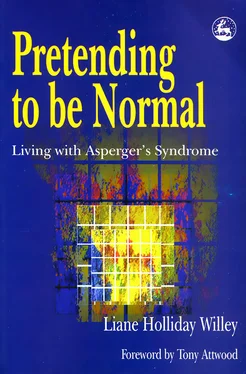Liane Holliday Willey - Pretending to be Normal
Здесь есть возможность читать онлайн «Liane Holliday Willey - Pretending to be Normal» весь текст электронной книги совершенно бесплатно (целиком полную версию без сокращений). В некоторых случаях можно слушать аудио, скачать через торрент в формате fb2 и присутствует краткое содержание. Город: London, Год выпуска: 2000, ISBN: 2000, Издательство: Jessika Kingsley Publishers, Жанр: Психология, Биографии и Мемуары, на английском языке. Описание произведения, (предисловие) а так же отзывы посетителей доступны на портале библиотеки ЛибКат.
- Название:Pretending to be Normal
- Автор:
- Издательство:Jessika Kingsley Publishers
- Жанр:
- Год:2000
- Город:London
- ISBN:1 85302 577 1
- Рейтинг книги:4 / 5. Голосов: 1
-
Избранное:Добавить в избранное
- Отзывы:
-
Ваша оценка:
- 80
- 1
- 2
- 3
- 4
- 5
Pretending to be Normal: краткое содержание, описание и аннотация
Предлагаем к чтению аннотацию, описание, краткое содержание или предисловие (зависит от того, что написал сам автор книги «Pretending to be Normal»). Если вы не нашли необходимую информацию о книге — напишите в комментариях, мы постараемся отыскать её.
Pretending to be Normal — читать онлайн бесплатно полную книгу (весь текст) целиком
Ниже представлен текст книги, разбитый по страницам. Система сохранения места последней прочитанной страницы, позволяет с удобством читать онлайн бесплатно книгу «Pretending to be Normal», без необходимости каждый раз заново искать на чём Вы остановились. Поставьте закладку, и сможете в любой момент перейти на страницу, на которой закончили чтение.
Интервал:
Закладка:
My deep, dark fear, the one that makes my bones scream, is that there are AS people in search of friendships who will never find any, no matter what they do, solely because of their AS. With those people on my mind, my heart breaks, for I know the reality that will wound them as they stumble forward, deeply lonely and ever more estranged from others. I hope that, as society continues to break the boundaries of normal, the boundaries so many cannot see and so many cannot find, this blight which robs good people of growth and happiness will ebb into a distant hollow, unseen and forgettable. And then, maybe then, the world really will welcome all people.
5
Crossing the Bridge
I mark my life by moments in time,
captured like morning glories at dawn,
small and simple, yet fine and real.
Moments define me, they make me complete.
I envision the times that come together to form who I am.
Each vison finds me nearing a bridge,
some slippery and unstable made of ropes and broken planks,
some certain and solid and well worn beneath iron gates,
all of them promising a worthy journey,
should I only have the will to follow their lead,
and my friend to hold my hand as I cross.
As most of my AS traits continue to fade away, I have noticed the most tenacious of the lot scatter like bubbles in the breeze, popping up here and there and usually at the most inopportune moments, teasing me from the thought that I will ever be anyone else’s normal. Try as I might to catch and contain them, these are the qualities I will never lose and only rarely hide. I would not mind, so much, these reminders of my unique character, if they were of a different sort. For instance, I feel no shame over my poor spelling or my central auditory discrimination problems because the consequences they provoke are easily explained and largely benign. But when I discover I have let my guard down and wandered into a place that provokes my sensory integration dysfunction or my inability to cue in on someone’s point of view — I lose my footing and find myself dizzy, shaken, nauseated and hot — acutely hot, so hot it hurts to touch my face or focus my eyes. When this happens, I desperately look for the only person who can almost instantly save me from reeling beyond control. I reach for my husband.
No matter how many times I say it, I cannot overemphasize how important a strong support system is for people with AS. Friends and family members are of course crucial members of that support team, but I have to think that the majority of influence comes most naturally from the person we with AS choose to share our lives with, that is if we choose someone. I marvel at those in the Asperger’s community who find wonderful success seemingly without the support of someone close, for I know I would never have come this far if my husband had not been by my side. Not that our life together has always been easy. Like all married couples, we have had our share of problems, particularly when it comes to the one big issue that tears most marriages apart. The stuff of communicating.
By the time I met my husband I was pretty well convinced I would never understand anyone well enough to maintain something everlasting. The men I had been dating were nice men who shared some of my interests and hobbies, but with each of them there was always an unspoken and unseen something that stood between us — like the curtain that kept the truth of the Wizard from the people of Oz. I never gave much thought to what the curtain was hiding because when I did, it led me to distraction. I could not intrinsically or intuitively fathom what lay in the shadows, things I can now identify as the cornerstones for patience, flexibility, empathy and objectiveness. Before I came to terms with myself, these emotions were held at bay, nearly in my vision but just beyond my reach. It took years with my husband before I could swim to each one. Years before I could catch them and store them safely in my heart. My AS behaviors — the sensory integration problems, literal mindedness, perseverance and rigid thinking tendencies — acted like arrows tipped in poison that stood poised and ready to pierce every relationship I ever found.
From the moment I met Tom, I sensed he was a great deal like me. He had an interest in virtually all of my favorite activities, even my favorite pastime that no one else had ever expressed an interest in. Tom was just as enthralled as I was by university campuses… their architecture and structure, their quaint museums and galleries, their landscape and athletic stadiums, and their research libraries and bookstores. Later, it came as no surprise to me when he expressed an interest in becoming a college professor. The university environment is the perfect backdrop for his personality and mine. Many things caught our mutual interest, but virtually every one was linked by a common tie to solitude. Like me, Tom dislikes crowds and social gatherings. He does not care for environments that are charged with emotion or chaos, and he does not care how he fits in with the rest of the world. Like me, he is a loner. Quiet and calm became our glue. Now, I know that sounds simplistic and maybe even too subdued to act as a catalyst for togetherness, but in our case it provided a strong bond. To this day, it is the very element that draws us together even when we are at our worst.
When I try to list all the cracks in our communication, I immediately focus on how hard it is for me to follow Tom’s logic. He is a man of few words and I require grand elaborations, well calculated metaphors and strong visual images to understand language. For instance, if Tom were to tell me he was disappointed he had missed me at lunch, I would wonder if he meant to say he was sad — which is simply regretfully sorry; unhappy — which is somewhere between mad and sad; disheartened — which is a lonely sad; mad — which makes you want to argue with someone over what they had done; angry — which makes you want to ignore the person you are feeling this way towards; furious — which makes you want to spit; or none of the above. In order for me really to understand what people are saying I need much more than a few words mechanically placed together. A succinct speaking and writing style is not nearly enough for me. Words by themselves are too vague. Rich elaborations sitting along side colorful words come to life in my mind drawing pictures as they pull my thoughts together. But sometimes, even the most telling and detailed sentences are not enough to help me comprehend what is being said to me.
For the first several years of our marriage, Tom had no idea I was misconstruing his thoughts because, from his perspective, he had been clear and articulate. He was left to think I had just failed to listen to him while I was left wondering why he did not care that he had confused me so. My friends tell me their conversations with their spouse can also become confused and exasperating, particularly when they are engaged in discussions that require any intellectualizing or philosophizing, maybe something to do with their morals or ethics or religion or their ethereal ideals and values. But our communication discrepancies came more frequently than once in a while. Even when we spun words around the mundane and the routine — movies we had seen, books we had read, chores we had to do and trips we planned to take — even this kind of small talk, anchored in passing a few ideas or a bit of time, could send my thoughts and contemplations into a swirl of disarray.
I cannot adequately describe how convoluted our discussions became, back before we knew each other’s style of communicating was wreaking havoc on the messages we were meaning to convey. Suffice to say we would both argue for hours, all the while thinking to ourselves that nothing we were hearing was making any sense. I know that from my perspective it was almost as if my husband would begin to speak a foreign language. I would hear the words that came out of his mouth, but I simply could not attach any meaning to them. It was if they were random words pulled from a dictionary, placed in a sentence and then set before me as a complex and unsolvable word puzzle. I vividly recall many times when I would see my thoughts swirling in a tide, trying desperately to grab onto something familiar and safe. For years I thought this was the way it was for everyone. After all, isn’t this what popular culture and the mass media tell us, that men and women are unable to communicate, that they are wired too differently to ever connect? I came to believe our inability to communicate was the norm. I convinced myself every woman felt like each word from their husband’s mouth ran backwards, slipped through thresholds and hid under the surface never intending to be found. I even knew, was just positive, that wives across the world reacted like I did when their ears and mind were deceived. I believed each of them fought with their breathing for control of their speaking voice and their consciousness. Yet when I would ask other women if they could relate to my experiences, they would tell me they could barely even understand what I was trying to describe to them, much less relate to me. Of course they had arguments, they would tell me, but not like that. They never felt they were losing sight of the real world or that their husband was speaking in tongues. They simply reported that they and their spouse disagreed on an issue, told one another so, had their discussion and then either went their separate ways or got over the discrepancies. It did not take long for me to realize that once again, I was not following a normal path. Once again, I found myself face to face with my Asperger traits.
Читать дальшеИнтервал:
Закладка:
Похожие книги на «Pretending to be Normal»
Представляем Вашему вниманию похожие книги на «Pretending to be Normal» списком для выбора. Мы отобрали схожую по названию и смыслу литературу в надежде предоставить читателям больше вариантов отыскать новые, интересные, ещё непрочитанные произведения.
Обсуждение, отзывы о книге «Pretending to be Normal» и просто собственные мнения читателей. Оставьте ваши комментарии, напишите, что Вы думаете о произведении, его смысле или главных героях. Укажите что конкретно понравилось, а что нет, и почему Вы так считаете.












